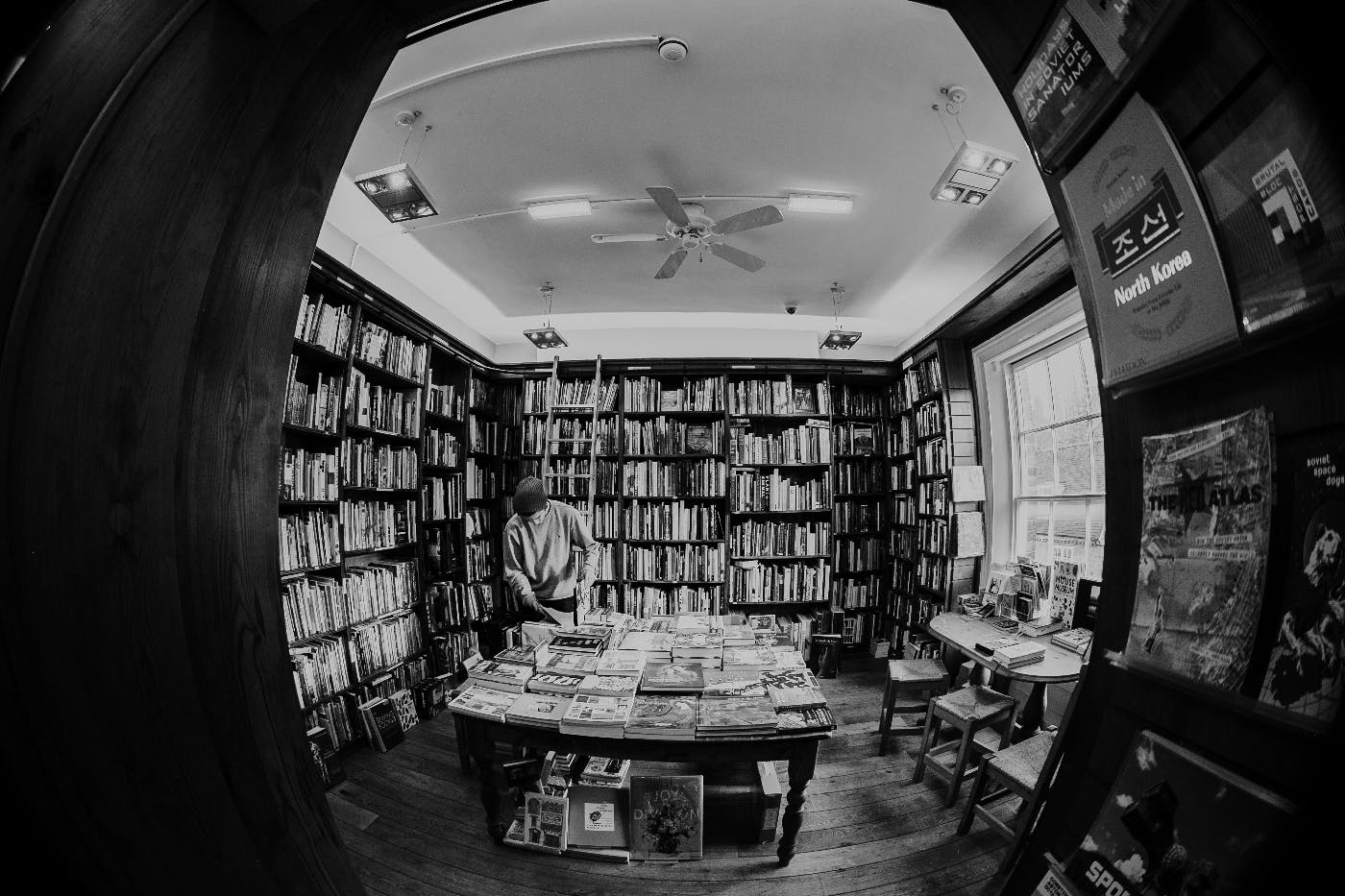
Books, both physical and digital, hold a unique and irreplaceable position in human culture and personal development.
I love going to bookstores, especially independent bookstores. I particularly love going to bookstores with my dear friend Heather. She is a writer with great skill and a reader of a wide scope. When we meet, she usually starts our conversations with, “I’m reading this book …” When I go to a bookstore with her, I know two things will happen. First, three hours will go by rather quickly, and second, I will discover a book or books that I never knew about, and I will be turned on to new authors.
One of my favorite things about going to a bookstore with Heather is watching her choose the books she will buy. She will pull a book off the shelf, read the cover, tell me about the author and past books, and then carry the book around with her; this is her making friends, period. She likes to hold the book, feel the book, and make friends with it before she buys it. By the end of the book-buying excursion, some books hadn’t made the cut, and she hadn’t become good friends with them, so they went back on the shelf. But she gives them hope. “Not this time,” she says, patting the book when it has been nestled back in its space.
Even if you’re not a reader, if you have a friend who is, go to a bookstore with them. It’s a trip.
One time, many, many years ago, when I was on tour, I stopped in City Lights in San Francisco. It was late; I believe I had an hour before closing. I wanted to grab one of the pocket series copies of Howl. I grabbed the thin book and looked around, absorbing the vibe. A clerk passed by and said, “He’s here, you know.” I looked at him; he looked upstairs to the open loft area. I followed his gaze, and there, sitting behind the desk piled with books and papers, was Lawrence Ferlinghetti. I stood silently and watched him read for a moment, then moved to the register to pay for my book. The same clerk was there. I bought the book and said, “Thanks, that was really, really cool.” He smiled and said, “Thanks for being cool about it; I figured you’d handle it well.”
I’ve never picked up a girl in a bookstore. I have spent entire days, from opening to almost closing, in bookstores, reading, writing, and drinking ulcer-producing amounts of coffee. I love the smell of books, the feel of them, the tooth of the paper, the titles, and the possibilities. I used to think I was a reader until I met Heather; now, I consider myself a casual reader. Still, I love books.
I am feeling sentimental today and sad about the loss of East Bay Booksellers, so I will write about books today. Not eBooks or eReader, actual hold in your hands, moisten your thumb, turn the page books.
Books
Books, both physical and digital, hold a unique and irreplaceable position in human culture and personal development. The recent tragic loss of East Bay Booksellers in Oakland, a sanctuary for book lovers, is a stark reminder of books and bookstores' profound impact on individuals and communities. In an age where technology permeates every aspect of our lives, it’s essential to reflect on the enduring importance of books.

The Tangibility of Physical Books
Books are tangible artifacts. They are human, physical, and possess a distinctive smell and feel. The texture of the cover, the rustle of pages, and the slight resistance when turning a page with a moistened thumb contribute to a sensory experience that digital screens cannot replicate. This tactile interaction enhances the reading experience, making it more immersive and memorable.
Each book tells a story beyond its written content. The dog-eared pages, the coffee stains, and the handwritten notes in the margins add layers of personal history and connection. The poet Billy Collins talks about the wonders of these marginal notes in his poem, Marginalia. These physical markers create a bond between the reader and the book, making it a cherished possession. The weight of a book in one’s hands, the act of turning its pages, and even the space it occupies on a shelf all contribute to its significance.
The Solitary Act of Reading
Reading is an inherently personal and solitary activity. It is a moment of introspection, imagination, and escape. Unlike many forms of modern entertainment that demand social engagement, reading allows for deep personal reflection. In the quiet moments spent with a book, readers can explore new worlds, ideas, and perspectives without distraction.
While book clubs and discussions can enrich the reading experience by providing social interaction and diverse viewpoints, the act of reading itself remains an intimate journey. This solitary nature of reading fosters a unique bond between the reader and the author as if engaging in a private conversation that transcends time and space.
The Social Role of Bookstores
Bookstores are not just retail spaces; they are cultural hubs and community sanctuaries. Places like East Bay Booksellers provide a physical space for people to gather, explore, and celebrate literature. Bookstores foster a sense of community among readers, offering a venue for author events, book signings, and literary discussions.
The social interactions that occur in bookstores—striking up a conversation with a fellow reader, getting a recommendation from a knowledgeable bookseller, or simply browsing through shelves alongside others—create a sense of belonging. These interactions are absent in the digital realm, where buying an ebook on Amazon is a solitary, transactional experience devoid of human connection.
The Aesthetic and Emotional Value of Books
Books contribute to the aesthetic and emotional fabric of our lives. The sight of a well-stocked bookshelf can be comforting and inspiring. The arrangement of books, whether by genre, color, or author, reflects personal tastes and intellectual journeys. Each book on the shelf is a testament to the reader's curiosity and exploration of the world.
Books also serve as emotional anchors. They can evoke memories of specific times, places, and people. A book received as a gift, a novel read during a significant life event, or a story that provided solace during difficult times becomes imbued with personal significance. This emotional connection to books enhances their value far beyond their monetary cost.
The Intellectual and Educational Impact of Books
Books are fundamental to intellectual growth and education. They are vehicles for knowledge, imagination, and critical thinking. Through reading, individuals gain access to a vast array of ideas, cultures, and experiences. Books stimulate the mind, challenge assumptions, and inspire innovation.
Educational systems have long relied on books as primary tools for learning. Textbooks, literature, and academic journals are essential for students and scholars. The process of reading and comprehending complex texts develops cognitive skills such as concentration, comprehension, and analytical thinking. These skills are transferable to various aspects of life, making reading an invaluable practice for personal and professional development.

The Preservation of Culture and History
Books play a crucial role in preserving culture and history. They are repositories of human thought, creativity, and achievement. Through books, the knowledge and stories of past generations are transmitted to future ones. Historical texts, classic literature, and cultural narratives provide insights into different eras' values, struggles, and triumphs.
The preservation of books is also vital for safeguarding the diversity of human expression. Libraries and archives worldwide work to maintain collections representing the breadth of human experience. This preservation ensures that future generations can access the rich tapestry of human history and culture.
The Power of Storytelling
Storytelling is a fundamental human activity, and books are one of its most powerful mediums. Stories can transport readers to different times, places, and realities. They evoke emotions, provoke thoughts, and foster empathy. Readers can live vicariously through characters, experiencing joys, sorrows, and challenges.
The power of storytelling lies in its ability to connect people across boundaries. A well-told story can resonate with readers from diverse backgrounds, creating a shared human experience. This universality of storytelling underscores the importance of books for fostering understanding and empathy in a divided world.
Books vs. eBooks: Complementary, Not Competing
While eReaders and Kindles are not inherently bad, it is essential to recognize that they complement rather than replace physical books. Digital books offer convenience, accessibility, and portability. They are especially valuable for those with limited physical storage space or readers who travel frequently.
However, the experience of reading a physical book is irreplaceable. The deliberate act of selecting a book from a shelf, feeling its weight, and engaging with its physicality provides a sense of connection that digital devices cannot replicate. Both formats have their place in the modern reading landscape, each offering unique benefits.
The Future of Books
The future of books is not a binary choice between physical and digital formats. Instead, it is about embracing the strengths of both. Physical books will continue to hold their timeless appeal, offering a tangible and sensory-rich reading experience. Digital books will evolve, providing greater accessibility and interactive features.
What remains constant is the importance of reading itself. As long as people seek knowledge, entertainment, and emotional connection, books will remain vital. The tragic loss of East Bay Booksellers is a reminder of the need to support bookstores and literary communities, ensuring that the love of reading endures for generations to come.
Summing Up
Books are more than just pages bound together; they are gateways to knowledge, culture, and personal growth. The sensory experience of physical books, the solitary act of reading, the social role of bookstores, and the intellectual and emotional value of books underscore their irreplaceable importance. In an increasingly digital world, the enduring appeal of books reminds us of the unique and timeless power of the written word. Supporting and cherishing books and bookstores is essential for preserving this invaluable aspect of human culture.
With deep sorrow for the loss of East Bay Booksellers. 7/31/2024

